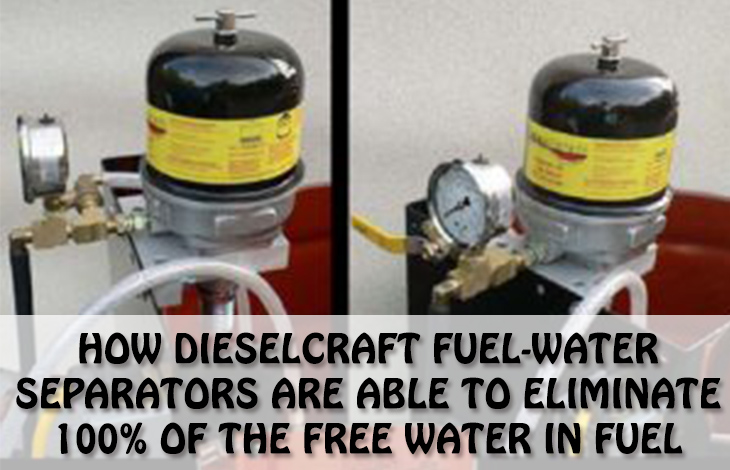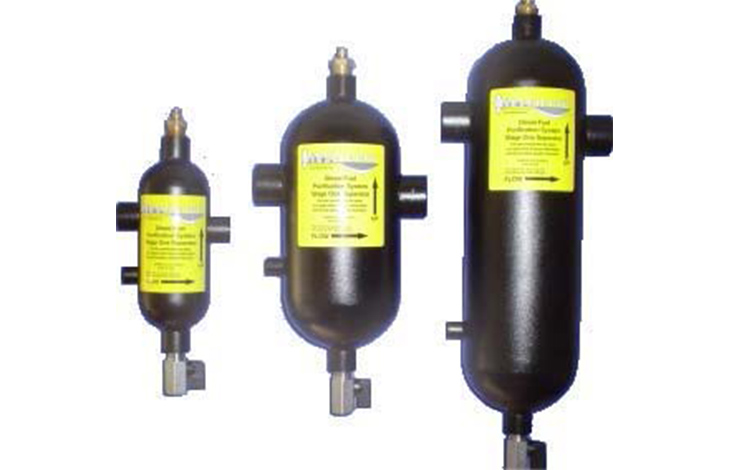How Dieselcraft Fuel-Water Separators Are Able to Eliminate 100% of the Free Water in Fuel

We are always advised to prevent water from getting into our fuel tanks. There are various reasons why water should never find its way into your diesel engine. Engines are designed to keep water, oil and fuel channels completely separate preventing them from contaminating each other. Nevertheless, water molecules often find their way into the fuel systems of advanced machinery and if not dealt with, could end up causing a lot of damage o delicate and expensive engine components. In order to prevent damage to your engine due to the presence of free water in your fuel systems, it is necessary to invest in fuel-water separators which have been designed to eliminate all the water molecules in your fuel of choice.
Why is it necessary to separate water from fuel
Water has both direct and indirect effects on diesel engines leading to the clogging of fuel injectors and filters and eventual engine failure. Diesel engines cannot operate efficiently with water in the fuel system.
Direct hazards of water in fuel
- Rust is formed whenever water comes into contact with iron. The rust corrodes the metallic parts of the fuel system and dislodges particles which can cause abrasions in the fuel system and damage vital engine components.
- Etching is the eating away of metal surfaces by sulphuric acid and hydrogen sulphide which is formed when water induces fuel degradation.
- Ice can form in the fuel system when a car with free water particles in the fuel is driven in a sub-zero climate. This is a real challenge because while water freezes at 00C, most fuels freeze at – 28.80 Ice fragments act like dirt particles and can clog filters or damage nozzles. When damage is caused by dirt, it is possible to find debris in the filters but ice damage doesn’t leave any physical evidence as it can melt away before inspection.
Indirect hazards of water in the fuel includes
- Soft Solids formation occurs when water mixes in with hydrocarbons. Water is a polar compound while hydrocarbons are non-polar. The polar chemicals found in hydrocarbon chains of additives are usually attracted to water and can separate from the additives and bond with water molecules. This combination forms new substances known as soft solids which can easily clog filters and reduce the stability of the additives.
- Microbes like bacteria and moulds or fungi thrive in environments where they can access food and water. The presence of free water in your fuel system creates an environment conducive for the growth of microorganisms and encourages the development of slimes and other substances that contaminate your fuel further and interfering with the efficiency of your engine.

How Fuel-Water Separators Work
Fuel-Water separators are the most effective devices that have been designed to eliminate the water in the fuel. While there are a wide variety of designs from various companies, the basic principle is the same. The separators have two main stages.
In the first stage, the fuel-water mixture is directed through a pleated paper element which enlarges water droplets so that they are larger and can fall into the water sump at the bottom of the filter due to gravitational force.
In the second phase, water droplets that escape the first stage find their way into a silicon-treated nylon capable of preventing the smallest particles of water from reaching the crucial parts of the engine.
It is important to check the fuel-water separator regularly and open the release valve to drain the filtered. The separator also works well to prevent dirt and other debris from getting to the fuel pump and consequently to the engine.
Dieselcraft Filters
Dieselcraft has been in operation for more than 15 years constantly producing world-class products for the diesel industry with a range of oil filtration systems and fuel-water separators as well as services like fuel polishing and testing of oil and fuel in the laboratory or out in the field.
With its vast experience in the industry and constant innovation, the company has been able to develop a fuel-water separator for diesel engines that is capable of eliminating up to 100% of the free water in your fuel.
Conclusion
Fuel Water separators are integral parts of modern diesel engines because you cannot completely prevent the formation of water in a diesel fuel system even with the stringent conditions and tests being made on the quality of fuel supplied at filling stations, some water often finds its way into the fuel tank.
Numerous modifications and innovations have been made to improve the overall performance of diesel engines in recent years. However, the high performance is directly influenced by the quality of fuel coming into the engine, consequently, any contamination can cause extensive damage to engine parts resulting in high maintenance and service costs.
Read Also:





